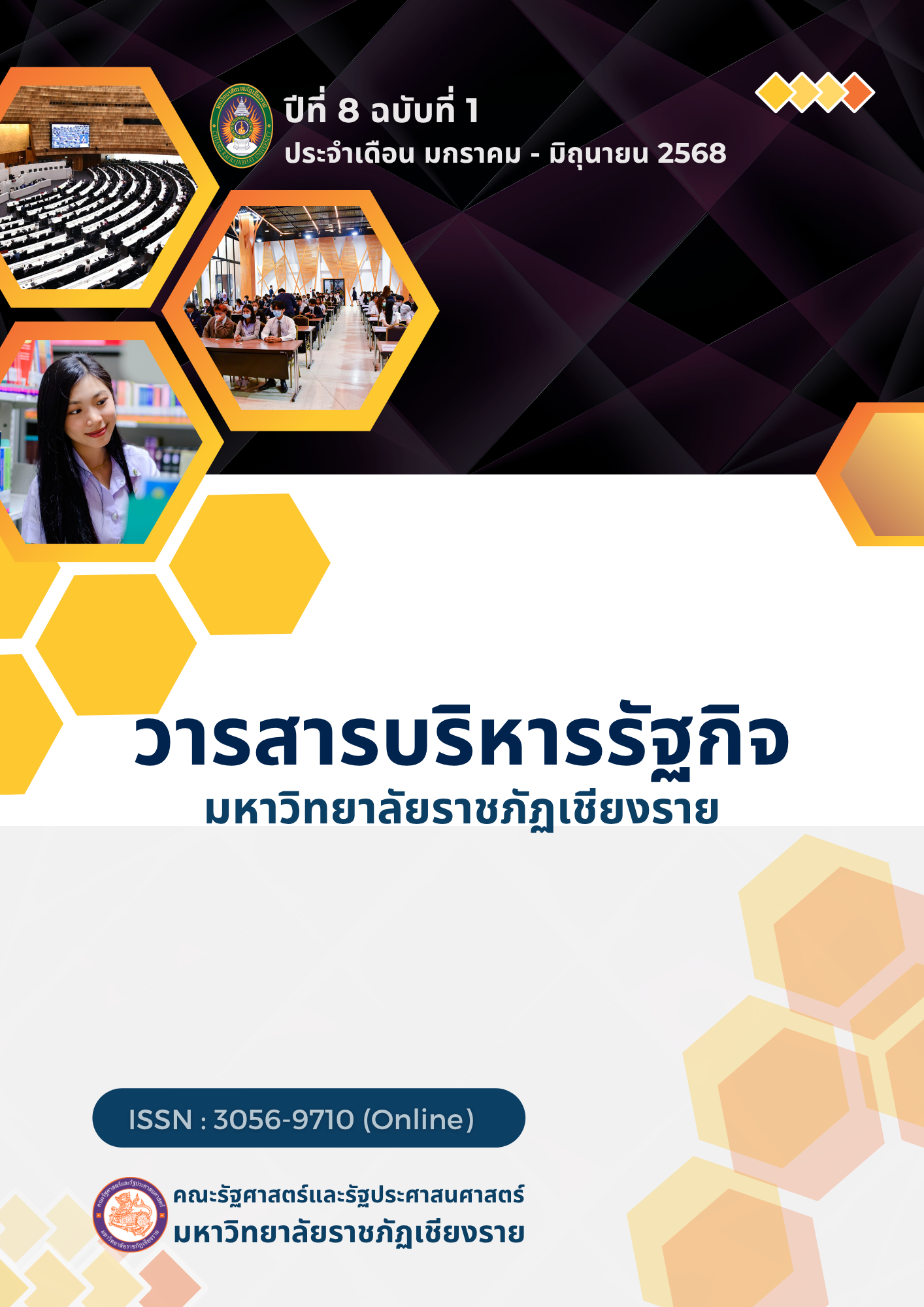Conceptual Frameworks of Sustainable Urban Development: Proposals for Local Development
Main Article Content
Abstract
This academic article aims to explain the conceptual framework for urban development, focusing on the integration of sustainable and concepts and highlighting the role of local administrative organizations as a key mechanism in driving urban development in accordance with the context of Thai society. A review and synthesis of urban development concepts in terms of sustainability at the local level. This review indicates that development with clear goals and systematic implementation can maximize resource efficiency while enhancing the quality of life for citizens across physical, economic, social, and environmental dimensions. Sustainably developed cities can reduce inequality and promote equitable access to basic services. Moreover, urban development should consider the connectivity and alignment between cities and local administrative organizations, while considering the specific context of each area. The key proposal of this article is that genuine decentralization of power to local administrative organizations should be pursued, enabling them to effectively and sustainably define, plan, and implement urban development according to the unique characteristics of their areas.
Article Details
References
คุณากร กรสิงห์ และณัฐชัย นิ่มนวล. (2566). การศึกษาแนวทางการพัฒนากระบวนการเป็นเมืองอย่างยั่งยืนขององค์การบริหารส่วนตำบลนครสวรรค์ตก จังหวัดนครสวรรค์. วารสารพิกุล, 21(2), 289-304.
ณัฏฐ์ณัชชา ไชยประเสริฐ. (2565). บทบาทท้องถิ่นกับการบริหารจัดการเมืองแบบ Smart City. วารสาร มจร บาฬีศึกษาพุทธโฆสปริทรรศน์, 8(1), 72-84.
เปมนีย์ จันทร์สอกลิ่น. (2564). กรุงเทพมหานครกับการพัฒนาเมืองอย่างยั่งยืน. วารสารความเป็นธรรมทางสังคมและความเหลื่อมล้ำ, 2(2), 34-50.
พระมหาวสันต์ หงอกชัย และ ชินวัตร เชื้อสระคู. (2567) การขับเคลื่อนสู่ความเป็นเมืองที่ยั่งยืน: การวิเคราะห์บทบาทของเมืองอัจฉริยะภาคีเครือข่ายและการบริหารจัดการของเทศบาลนครขอนแก่น. Journal of Roi Kaensarn Academi, 9(7), 644-656.
ภาฝัน จิตต์มิตรภาพ, ฤๅเดช เกิดวิชัย, พรกุล สุขสด และดวงกมล จันทรรัตน์มณี. (2565). ปัจจัยขับเคลื่อนความสำเร็จในการพัฒนาเมืองอัจฉริยะจังหวัดภูเก็ต. วารสารปัญญาภิวัฒน์, 14(1), 188–202.
มหาวิทยาลัยสุโขทัยธรรมาธิราช. (2566). การบริหารการพัฒนาเมืองและเมืองอัจฉริยะหน่วยที่ 9-15. นนทบุรี: มหาวิทยาลัยสุโขทัยธรรมาธิราช
รงค์ บุญสวยขวัญ. (2561). กรอบแนวคิดเพื่อการอธิบายการบริหารจัดการเมือง. วารสารราชภัฏสุราษฎร์ธานี, 5(1), 33-60.
สถาพร แสงสุโพธิ์ และเกรียงไกร เจริญผล. (2565). แนวทางการขับเคลื่อนศักยภาพท้องถิ่นให้มีความเข้มแข็งและยั่งยืนในศตวรรษที่ 21. วารสารภูมินิเวศพัฒนาอย่างยั่งยืน, 3(1), 28-40.
อรทัย ก๊กผล. (2559). Urbanization: เมื่อ “เมือง” กลายเป็นโจทย์ของการบริหารจัดการท้องถิ่นสมัยใหม่. กรุงเทพมหานคร: สถาบันพระปกเกล้า.
เอ็นเนจิง ทูเดย์ (Engineeringtoday). (2563). แนวทางพัฒนาเมืองอัจฉริยะของไทย สู่ความเป็นเมืองน่าอยู่อย่างแท้จริง. สืบค้นเมื่อ 25 มิถุนายน 2568, จาก https://www.engineeringtoday.net/พัฒนาเมืองอัจฉริยะ-smart-city/
Beatley, T. (2000). Green urbanism: Learning from European cities. Island Press.
Callender, J. (2012). Sustainable urban development. In A. Smith (Ed.), International Encyclopedia of Housing and Home, 7, 129–133. Elsevier.
Campbell, S. (1996). Green cities, growing cities, just cities? Urban planning and the contradictions of sustainable development. Journal of the American Planning Association, 62(3), 296-312.
Cohen, B. (2006). Urbanization in developing countries: Current trends, future projections, and key challenges for sustainability. Technology in Society, 28(1–2), 63–80.
Elkin, T., McLaren, D., & Hillman, M. (1991). Reviving the city: Towards sustainable urban development. Friends of the Earth.
Gehl, J. (2010). Cities for people. Island Press.
Hall, P., & Pfeiffer, U. (2000). Urban future 21: A global agenda for twenty-first century cities. Routledge.
Healey, P. (1997). Collaborative planning: Shaping places in fragmented societies. Macmillan.
Pierre, J., & Peters, G. (2000). Governance, Politics and the State. Basingstoke: Macmillan.
Przybysz, A. L., Lima, A. D., de Sá, C. P., Resende, D. N., & Pagani, R. (2024). Integrating City Master Plans with Sustainable and Smart Urban Development: A Systematic Literature Review. Sustainability, 16(17), 7692.
Roberts, P., & Sykes, H. (2000). Urban regeneration: A handbook. SAGE Publications.
Tacoli, C. (2003). The links between urban and rural development. Environment and Urbanization, 15(1), 3–12.
UN-Habitat. (2009). Planning sustainable cities: Global report on human settlements 2009. Earthscan.
UN-Habitat. (2016). Urbanization and development: Emerging futures. United Nations Human Settlements Programme.
UN-Habitat. (2020). World cities report 2020: The value of sustainable urbanization. United Nations Human Settlements Programme.
United Nations. (2015). Transforming our world: The 2030 agenda for sustainable development. https://sdgs.un.org/2030agenda
Wheeler, S. M. (1996). Sustainable Urban Development: A Literature Review and Analysis. Retrieved from https://escholarship.org/content/qt6mx0n01x/qt6mx0n01x.pdf?t=m22273


